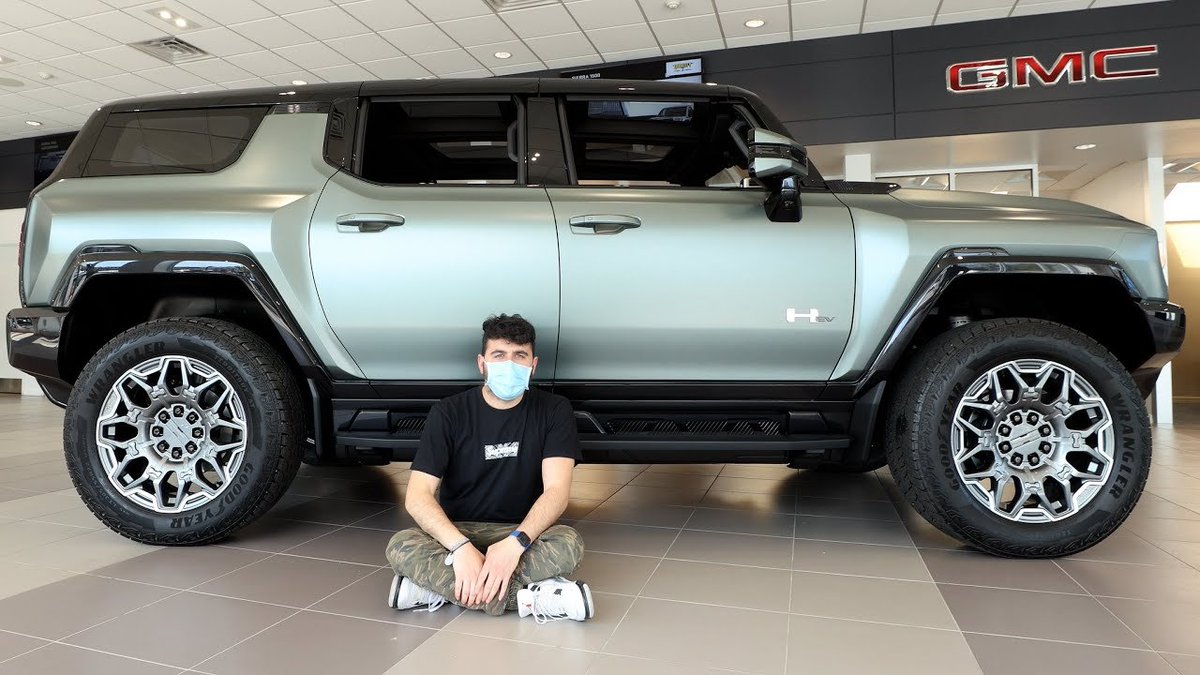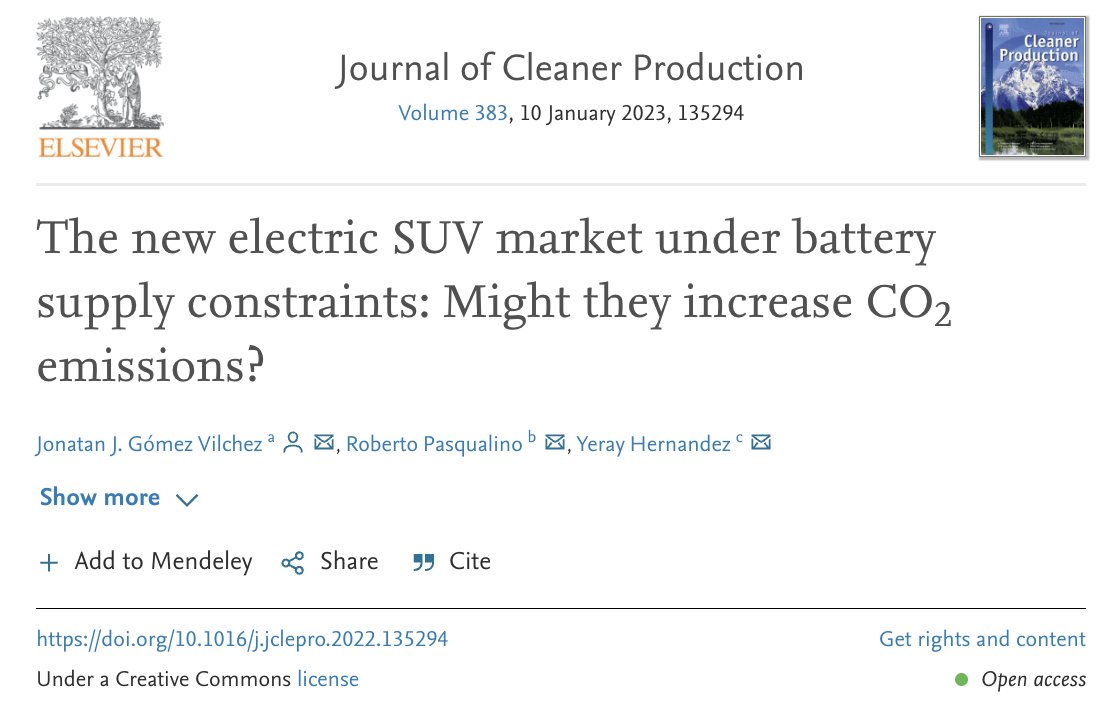
We’re only 13 days into 2023, but this might be the year when we finally realize that oversized, lightning-fast electric SUVs/trucks are a disaster – both for road safety and for the planet.
A 🧵
A 🧵

Enormous EVs pose several serious problems:
- The added weight of their battery makes them deadly in a collision
- Their needlessly fast acceleration puts other road users at risk
- They consume a LOT of scarce battery material and require vast amounts of power to charge
- The added weight of their battery makes them deadly in a collision
- Their needlessly fast acceleration puts other road users at risk
- They consume a LOT of scarce battery material and require vast amounts of power to charge

I'd like to think my article last week in @TheAtlantic helped draw attention to the these problems.
But I’m not the first to make these points. @ACEEEdc, @bcshaffer, and @CostaSamaras46 have been raising flags about EV bloat for a while.
theatlantic.com/ideas/archive/…
But I’m not the first to make these points. @ACEEEdc, @bcshaffer, and @CostaSamaras46 have been raising flags about EV bloat for a while.
theatlantic.com/ideas/archive/…
During #TRBAM (a huge transportation conference in DC this week) @MichaelReplogle asked a panel of USDOT senior officials about the safety risks of EV SUVs and trucks.
He didn’t get a clear answer, but many in the crowd nodded along w him.
He didn’t get a clear answer, but many in the crowd nodded along w him.

Then on Wednesday, @NTSB’s @JenniferHomendy gave a keynote explicitly calling out the dangers of enormous EVs.
Thousands of transportation professionals heard her speech, and it sparked a flurry of media attention.
Thousands of transportation professionals heard her speech, and it sparked a flurry of media attention.
A couple of articles this week:
This piece from NPR (btw, if enormous EVs can pulverize lighter cars, imagine what they’ll do to those walking and biking)
npr.org/2023/01/11/114…
This piece from NPR (btw, if enormous EVs can pulverize lighter cars, imagine what they’ll do to those walking and biking)
npr.org/2023/01/11/114…
This piece in @voxdotcom:
"Due to their batteries, electric vehicles can weigh hundreds of pounds more than their gas-powered counterparts...those extra pounds can create a dangerous situation."
vox.com/recode/2023/1/…
"Due to their batteries, electric vehicles can weigh hundreds of pounds more than their gas-powered counterparts...those extra pounds can create a dangerous situation."
vox.com/recode/2023/1/…
This article by @DavidFerris was especially interesting b/c it shows how uneasy the growing pushback against gigantic SUVs/trucks makes die-hard EV boosters. (cont'd)
eenews.net/articles/how-t…
eenews.net/articles/how-t…
This advocate has it backwards.
Consider: The Hummer EV's battery weighs as much as ~3 electric sedan batteries (or ~300 e-bike batteries). And we don't have enough battery material to go around.
Every Hummer EV wastes minerals that could've powered additional EVs.
Consider: The Hummer EV's battery weighs as much as ~3 electric sedan batteries (or ~300 e-bike batteries). And we don't have enough battery material to go around.
Every Hummer EV wastes minerals that could've powered additional EVs.

That point bears repeating. Oversized EVs could make climate change *worse* by consuming so much battery components that could otherwise be used to electrify more efficient vehicles.
Remember: A car isn’t environmentally friendly just b/c it’s electric.
doi.org/10.1016/j.jcle…
Remember: A car isn’t environmentally friendly just b/c it’s electric.
doi.org/10.1016/j.jcle…

It’s great to see so many people having an aha moment about the problems with EV behemoths.
Next step: Recognizing the destructiveness of gigantic gas-powered trucks and SUVs. They're at least as terrible.
theweek.com/articles/92919…
Next step: Recognizing the destructiveness of gigantic gas-powered trucks and SUVs. They're at least as terrible.
theweek.com/articles/92919…
New policies can change consumer behavior.
Two good places to start:
- Implement vehicle taxes/fees that scale based on vehicle weight (DC already does this)
- Revise NCAP (crash test program) to consider danger posed to those OUTSIDE the vehicle
Two good places to start:
- Implement vehicle taxes/fees that scale based on vehicle weight (DC already does this)
- Revise NCAP (crash test program) to consider danger posed to those OUTSIDE the vehicle
https://twitter.com/bypatrickgeorge/status/1613890644094615555?s=20&t=hgi3HANiAMJCfDqITVyzqw
We need new policies that push back against EV bloat.
Two good places to start:
- Implement vehicle taxes/fees that scale based on vehicle weight (DC already did this)
- Revise NCAP (crash test program) to consider risk posed to those OUTSIDE the vehicle
Two good places to start:
- Implement vehicle taxes/fees that scale based on vehicle weight (DC already did this)
- Revise NCAP (crash test program) to consider risk posed to those OUTSIDE the vehicle
https://twitter.com/bypatrickgeorge/status/1613890644094615555?s=20&t=hgi3HANiAMJCfDqITVyzqw
This person (who is ex-GM) is saying what carmakers want you to believe. Don't fall for it.
He ignores the billions of marketing $ carmakers spend *shaping* buyer tastes.
Also: Policies affect tastes. Fees reflecting heavy cars' damage --> Fewer buyers
He ignores the billions of marketing $ carmakers spend *shaping* buyer tastes.
Also: Policies affect tastes. Fees reflecting heavy cars' damage --> Fewer buyers
https://twitter.com/dennieredwards/status/1614002112119164934?s=20&t=5xjkZBjYay1mVwSBToQGyQ
• • •
Missing some Tweet in this thread? You can try to
force a refresh













